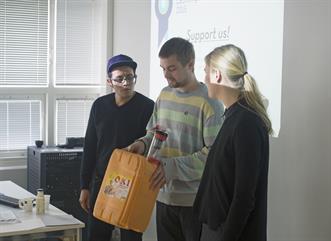Introducing Nanomaji

Aalto-born startup tackles water purification issues in Tanzania
Nanomaji (Maji refers to water in Swahili) was developed as part of the New Global innovation project, as a joint project between IDBM (International Design Business Management) and SGT (Sustainable Global Technologies) Masters programme´s. The student project was carried out in cooperation with Ahlstrom, a Finnish high-performance fiber-based materials company.
The project concentrates in bringing advanced technology to BOP (Bottom of the pyramid) market by creating a simple water filtration solution that fits the Tanzanian setting. Most people in East-Africa don’t have access to safe drinking water so to kill the bacteria and viruses, people boil the water using charcoal. Production of charcoal contributes to deforestation and burning it releases huge amounts of CO2 into the atmosphere. In addition, the indoor air quality is poor due to smoke from the stoves and the water is not necessarily safe for consumption even after the boiling.
Research and findings
The field research was conducted in Tanzania, by doing mostly observation and interviews. The gathered data was then compared to existing literature. Nanomaji organized participatory workshops to get input from the local start-up and product development experts. The main finding was that water is relatively abundant in Tanzania, but the quality is unreliable. Families spend a considerable portion of their income to purchase charcoal in order to boil water. Clearly a more affordable and effective solution was highly needed.
Nanomajis solution was to create an affordable filter that can be attached to the existing canisters used for water storage and transportation. By reducing the product to just the essentials to make it functional, you can still bring the highly advanced nanotechnology filter licensed by Ahlstrom to the average Tanzanian in an affordable price. The biggest challenge was to get the right information from the locals in Tanzania since often people want to make the situation seem better than it is. This is very important in the verification phase of the product since they might seem more positive about it than they actually are.
What is next for Nanomaji
Nanomaji recently won the Finlands ClimateLaunchPad competition, Europe’s largest climate innovation competition. They will compete against winners from other countries in Europe during September in Amsterdam.
The goal of ClimateLaunchPad is to give birth to and scale up the use of solutions to climate change. This will spur onwards hundreds of just-starting-up growth businesses in the development of their products and services. In this way, concrete solutions are formed towards an emission-free society that uses its resources wisely.
This post was written by AGI



